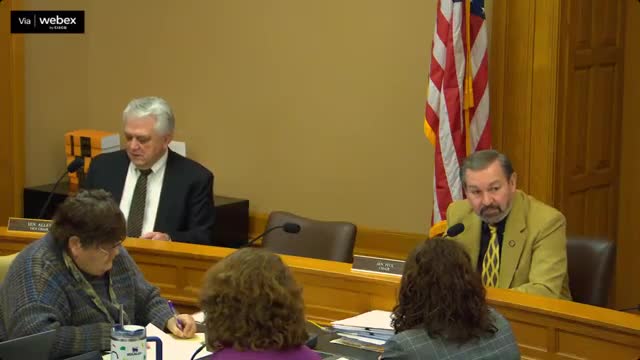Committee narrows tax collection and restores penalty limits in amended Senate Bill 184
Get AI-powered insights, summaries, and transcripts
Subscribe
Summary
The committee amended Senate Bill 184 to restrict the Department of Health and Environment's authority to collect charges to amounts assessed under the Kansas Dry Cleaner Environmental Response Act, restored a lower civil penalty cap and clarified corrective‑action payment rules, then passed the bill out of committee favorably as amended.
The Senate Committee on Agriculture and Natural Resources on Feb. 12 advanced Senate Bill 184 with several amendments that limit tax‑collection authority, restore penalty language, clarify corrective action payment rules and add guardrails for site outreach.
Revisor Lawrence told the committee SB 184 would amend the Kansas Dry Cleaner Environmental Response Act to change penalties, the required deductible for corrective actions, the environmental surcharge and solvent fee, and delinquency penalties related to those surcharges and fees. Committee members proposed and adopted multiple amendments before voting to pass the bill out of committee favorably as amended.
Key changes the committee adopted included a substitute amendment offered by Senator Francisco that limited the Kansas Department of Health and Environment’s ability to collect delinquent amounts to those “assessed pursuant to this act,” narrowing earlier language that would have broadly authorized collection; an amendment restoring the original civil‑penalty framework (including the previous $500 cap and statutory considerations) after concerns that the bill’s proposed cap raised penalties by roughly 20 times; revised language reinstating limited guardrails on agency outreach and site seeking while allowing standard public outreach and complaint response; and a clarification that payment for corrective action is authorized only where the action has been approved by the department and set out in a corrective‑action plan.
Senator Shane originally proposed striking the portion of the bill that would give KDHE broad authority to collect taxes; Senator Francisco offered a substitute that limited collection to taxes assessed under the dry‑cleaner act. Francisco said the substitute would ensure any collection authority was limited to fees and assessments specifically tied to the dry‑cleaner cleanup program rather than a general tax‑collection power. “If we’re giving the secretary that ability, we want it to limit it just to taxes related to this act,” Francisco said.
Committee members also debated the size of civil penalties. One member noted the department had not issued many penalties in recent years (the department cited 2017 as the most recent instance), and argued civil penalties are intended to be prohibitive rather than punitive. The committee restored the prior penalty language and cap while leaving room for future discussion about raising the cap if regular violations occur.
Other amendments clarified that the department may pay costs of corrective action only for activities that have received department approval and are documented in a corrective‑action plan, and that the agency may continue routine outreach and response to complaints but should not engage in unfettered site‑seeking without guardrails.
Following adoption of the amendments, Senator Bowser moved that committee pass SB 184 favorably as amended; the motion carried on a voice vote and the bill will advance from committee for further consideration.
